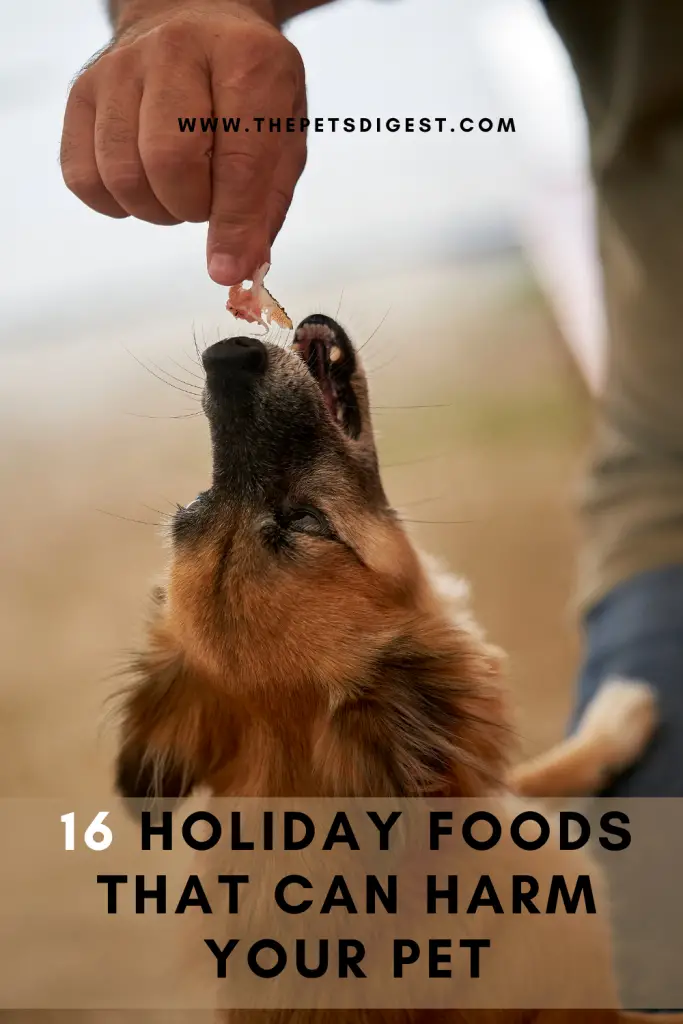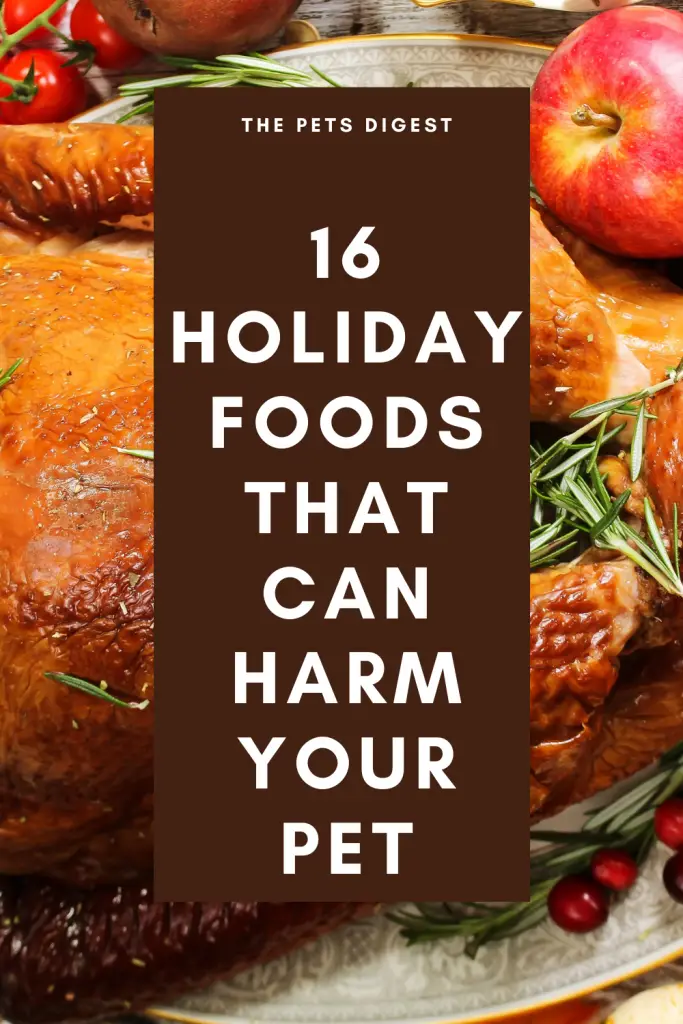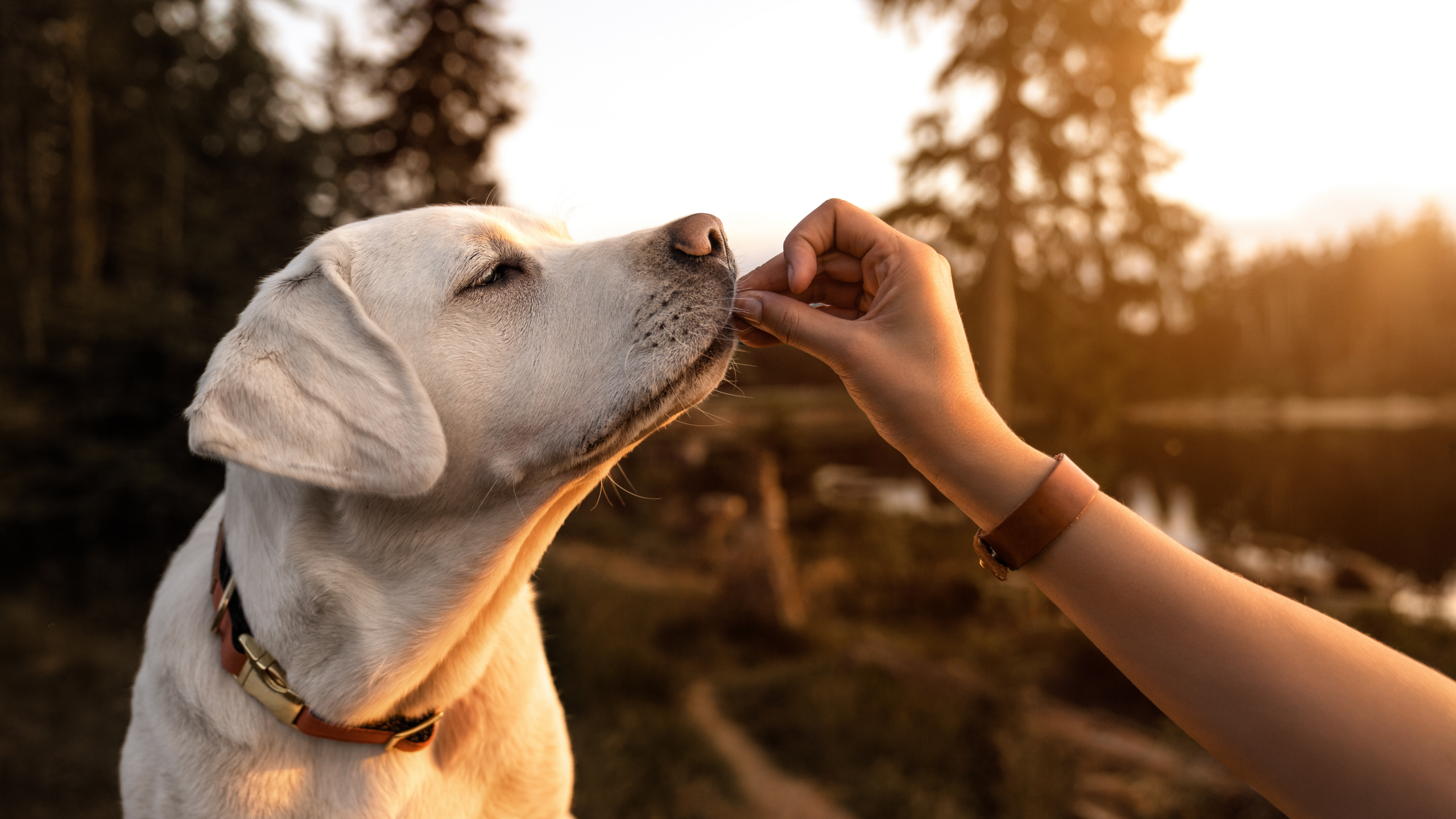Do you have a dog or cat and want to include them in the holiday festivities this Christmas or Thanksgiving? Read this list to make sure that you do not give your dog or cat any of the foods below!
Imagine having a wonderful holiday dinner only to be awakened at 3 a.m. by that awful retching noise coming from your dog (you know the one). The one that makes you immediately jump up because who wants to be cleaning up vomit at the crack of dawn right? Well, in some cases if it’s due to an episode of acute pancreatitis, this can, unfortunately, be followed by a 3 a.m. emergency trip to the vet as well.
The holidays are a time of coming together, bonding, and in some unfortunate cases episodes of pancreatitis or another gastrointestinal issue. If you want to read more about pancreatitis, visit my article here. After working in a vet clinic for years, I’ve learned that there are usually increased visits by stressed pet owners during and immediately after the holidays.
Keeping your pet safe during these times is essential especially and below are 10 foods that we often cook during the Holiday season, but can wreak havoc on your pet’s stomach.

1. Onions, garlic, chives, and leeks (Allium species):
Eating onions and garlic can cause damage to your pet’s red blood cells resulting in anemia. Cats are more sensitive than dogs to allium toxicosis and in some cases, blood transfusions may be necessary if the anemia is severe.
2. Bones
I still meet and work with people who give their dogs bones. But guaranteed if you’ve had to prop a snarling chihuahua’s mouth open and try to extract a bone from its throat you would think twice before doing so. While some owners have no issues when feeding their dogs raw bones, I would definitely steer clear of feeding cooked bones as they are hard and easily splintered. There are many detrimental effects that the bones can have including
- Puncture of the intestines and resultant blood in the stool
- Mouth or tongue injuries
- Bones stuck in the throat
- Broken teeth
- Blockage
- Constipation or diarrhea
3. Vanilla Extract
Yes, Vanilla extract and imitation vanilla have a very high alcohol content that can be toxic to your pets. Dogs and cats can not break down alcohol in their system, and if your pet consumes too much they can suffer from alcohol poisoning. If this is a concern of yours try using an alcohol-free vanilla that is made with vegetable glycerin. Some clinical signs of toxicity include:
- Vomiting
- Diarrhea
- trouble breathing
- Problems coordinating movement
4. Ham
Although most dogs will be okay with extremely small amounts of ham, it can cause pancreatitis since it is high in fat and salt. Many of the symptoms are gastrointestinal based and include:
- Vomiting
- Diarrhea
- Lethargy
- Lack of appetite
- Sluggishness and general malaise
5. Stuffing
Stuffing is usually full of ingredients that don’t sit well with pets like salt, onions and garlic so make sure you steer clear of feeding it to your fur baby. Many of the clinical signs will be associated with the particular ingredient that caused the illness.
6. Chocolate and chocolate desserts
What is a holiday celebration without a little dessert? While pets shouldn’t eat anything like cake or cookies feeding them these items with chocolate is oftentimes a double whammy to their stomachs.
While there are factors that go into the severity of chocolate poisoning such as the type of chocolate and pet size, you still want to refrain from allowing your pet to indulge.
Theobromine is the toxic component of chocolate that humans can easily metabolize, but dogs and cats can not. Signs of toxicity can range from vomiting or diarrhea to death. Hyperactivity is often one of the initial signs of theobromine poisoning in dogs and includes:
- Agitation
- Vomiting
- Diarrhea
- Irregular heartbeat (fast)
- High blood pressure
- Nervousness
7. Caffeine
Speaking of theobromine, it is a cousin to the chemical caffeine. So you can surmise the effects are generally the same. A small dog or cat can die from eating a moderate amount of caffeine from coffee, energy drinks, tea bags, or pills that have caffeine in them.
8. Grapes & Raisins
Many people are unaware that grapes and raisins can have a significantly negative impact on their pet’s health. They can cause tremendous damage to the kidneys and can even result in death. Clinical signs usually begin with some vomiting and diarrhea but can quickly take a turn resulting in kidney failure within days. The signs can then progress to:
- Weakness
- Lack of appetite
- Excessive drinking
- Painful abdomen
- Acute renal failure (within 48 hours) – unknown reason
9. Ice Cream
Did you know most dogs are lactose intolerant? That is one of the major reasons you shouldn’t feed your dog ice cream! It is also loaded with sugar which can be a major source of abdominal upset and can cause issues if your pet has diabetes. While a small amount of ice cream may be given without any signs of stomach upset some of the symptoms that your fur baby was given too much include:
- Gas
- Bloat
- Constipation
- Diarrhea
- Vomiting
- Weight gain – if given often obviously
Also, if feeding your pet ice cream is something you just can not live without doing, at least make sure it is chocolate and xylitol-free.
10. Turkey & Chicken Skin
Just like ham due to the high-fat concentration in the skin of these meats, your dog can quickly develop pancreatitis. In some cases, it only takes one time to eat something extremely fatty to start the disease process. Clinical signs of pancreatitis include:
- Vomiting
- Diarrhea
- Inappetance
- Lethargy and general malaise
- Pain in abdomen
- May have some blood in the stool
11. Baking soda, baking powder, and yeast
Making bread and cakes from scratch can be a wonderful, tasty experience but only if your pet doesn’t get a hold of some of the ingredients. If your pet was ever to get into baking soda, power, or yeast it can be extremely dangerous. Once the substance reaches their stomach it mixes with the acid and can begin to expand and release deadly gases. Signs include:
- Electrolyte imbalances (on test)
- Congestive heart failure
- Muscle spasms
12. Eggnog
While delicious, did you know that eggnog could also be highly fatal to dogs? Watch out for certain ingredients like alcohol and nutmeg in your eggnog. Also since it is loaded with fat and sugar it can cause pancreatitis and can even result in death.
13. Nutmeg
If your pup does happen to get into eggnog or ingest a large amount of nutmeg this toxicity can oftentimes prove to be fatal. At low doses, your pet should be fine, but this also depends on the size of your dog or cat. The toxicity stems from a compound called myristicin and clinical signs of poisoning include:
- Hallucinations
- Disorientation
- Increased heart rate
- High blood pressure
- Dry mouth
- Abdominal pain
- Possibly seizures
14. Mashed potatoes and sweet potatoes
While potatoes are generally safe and actually healthy for your pet when mixed with sugar, salt, and other ingredients they can prove to be dangerous. If you are going to give your dog potatoes make sure it is in small amounts and boiled with no sugar or salt added.
However, if your dog suffers from diabetes, you may want to steer clear of giving them potatoes as they may cause a spike in blood sugar.
15. Xylitol
The pancreas is a glandular organ that controls the release of insulin from the pancreas, xylitol stimulates a rapid release in dogs and cats and can very quickly be absorbed into the bloodstream which leads to hypoglycemia within an hour of ingestion. If hypoglycemia is left untreated the effects can be fatal, some initial clinical signs include:
- Vomiting
- Seizures
- Lack of coordination or difficulty walking or standing
- Lethargy
- Tremors
- Weakness
- Coma
16. Avocado
If you happen to have guacamole on hand during your festivities make sure to keep the avocados away from your cat or dog. Avocados contain persin, which is a fungicidal toxin and can cause severe health problems in cats and dogs. While most dogs are resistant to persin, I would still refrain from feeding them to your pet.


If you notice that your dog has acute diarrhea due to a change in food you should feed a bland diet and your veterinarian may ask that you start your dog on one of these over-the-counter medications for diarrhea.

























































































































